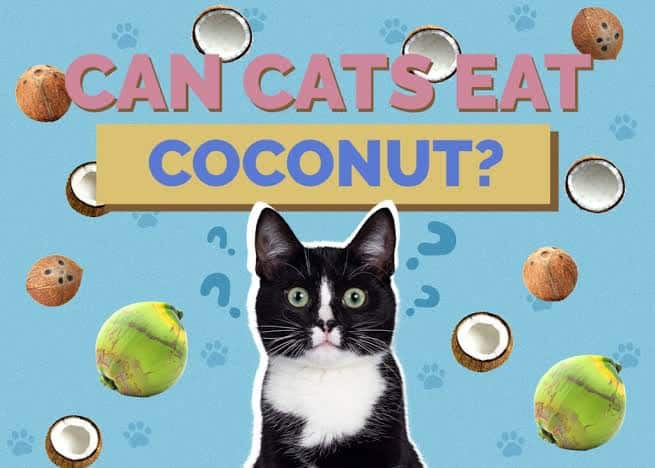In this blog post, we’ll discuss the topic “Can Cats Eat Coconut?”. We’ll provide information on relevant subtopics like; Overview Of Coconut, Types Of Coconut Products For Cats, Potential Benefits Of Coconut For Cats?, How To Safely Feed Coconut To Cats, etc.
As devoted pet owners, we understand the importance of providing our feline friends with a balanced and healthy diet. With the rising popularity of coconut-based products in human nutrition, you may be wondering if coconut is suitable for your beloved cat.
So, if you’re curious about whether coconut is safe for cats or if it should be avoided altogether, you’ve come to the right place.
Overview Of Coconut
Coconut, scientifically known as Cocos nucifera, is a versatile fruit that is widely cultivated in tropical regions around the world. It is known for its distinct flavor and various culinary uses. However, it is not only enjoyed by humans but also raises curiosity among pet owners about its suitability for their furry companions.
Recommended: Are Poinsettias Poisonous to Cats?
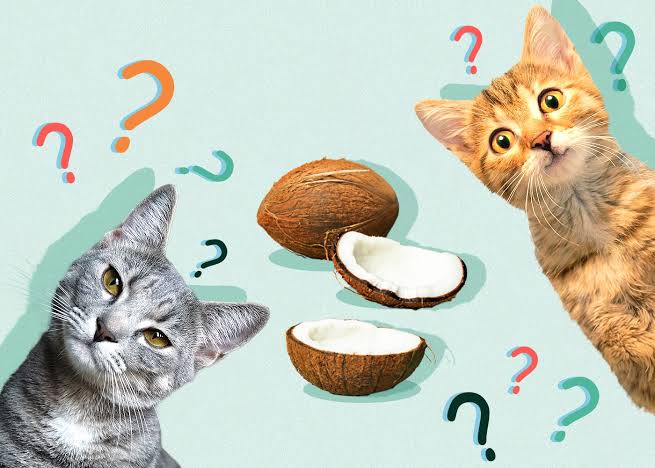
Types Of Coconut Products For Cats
Coconut comes in various forms, each offering unique flavors, textures, and potential benefits for cats. Here are some common types of coconut products that you may consider incorporating into your cat’s diet:
1. Coconut Oil:
Coconut oil is extracted from the flesh of mature coconuts and is prized for its versatility and health benefits. For cats, coconut oil can be used as a dietary supplement or as a topical treatment for skin and coat issues. When fed orally, coconut oil provides cats with medium-chain triglycerides (MCTs), which are easily digested and may offer various health benefits, including improved skin and coat health, digestive support, and immune system support.
2. Coconut Milk:
Coconut milk is made by blending grated coconut meat with water and straining out the solids. It is a popular dairy alternative in many cuisines and can also be offered to cats in small amounts as an occasional treat. Coconut milk is rich in vitamins, minerals, and healthy fats, but it’s essential to choose unsweetened varieties without added sugars or flavorings. While some cats may enjoy the taste of coconut milk, others may be lactose intolerant, so it’s essential to monitor their response.
3. Desiccated Coconut:
Desiccated coconut, also known as dried coconut or coconut flakes, is made by shredding and drying the flesh of mature coconuts. It is commonly used in baking and cooking to add flavor and texture to dishes. While desiccated coconut can be safely fed to cats in small amounts as a treat, it is high in fat and calories, so portion control is crucial to prevent overconsumption.
4. Coconut Water:
Coconut water is the clear liquid found inside young, green coconuts. It is naturally hydrating and rich in electrolytes, making it a refreshing beverage for humans. While coconut water is generally safe for cats to consume in small amounts, it’s essential to choose fresh, pure coconut water without any added sugars or artificial additives. Some cats may enjoy the taste of coconut water as an occasional treat, especially during hot weather or after physical activity.
5. Coconut Treats:
There are commercially available cat treats that incorporate coconut as a main ingredient. These treats are specifically formulated to meet feline dietary needs and may come in various forms such as crunchy bites, soft chews, or freeze-dried morsels. When choosing coconut treats for your cat, opt for high-quality products made from natural ingredients without any artificial additives or fillers.
Potential Benefits Of Coconut For Cats?
Coconut offers several potential health benefits for cats when incorporated into their diet in moderation. While more research is needed to fully understand its effects on feline health, here are some of the potential benefits of coconut for cats:
1. Improved Skin And Coat Health
Coconut oil is renowned for its moisturizing properties, making it a popular ingredient in pet grooming products. When applied topically or consumed orally, coconut oil may help alleviate dry skin and promote a shiny, healthy coat in cats. The fatty acids in coconut oil can also support skin barrier function and reduce inflammation, potentially benefiting cats with skin conditions such as dermatitis or allergies.
2. Digestive Support
The medium-chain fatty acids (MCFAs) found in coconut oil are easily digestible and may help support digestive health in cats. Coconut oil has been reported to have antimicrobial properties, which could help maintain a healthy balance of gut bacteria and prevent gastrointestinal issues such as diarrhea or constipation. Additionally, the fiber content in coconut can contribute to regular bowel movements and overall digestive well-being.
3. Immune System Support
Coconut contains antioxidants such as vitamin C and vitamin E, which play essential roles in supporting immune function and protecting against oxidative stress. By including coconut in their diet, cats may benefit from strengthened immune defenses, reducing their susceptibility to infections and diseases.
4. Weight Management
While coconut is relatively high in calories, the medium-chain triglycerides (MCTs) it contains have been associated with potential weight management benefits. MCTs are believed to increase energy expenditure and promote feelings of fullness, which could help prevent obesity in cats when incorporated into a balanced diet. However, portion control is crucial to avoid excessive calorie intake.
5. Dental Health
Coconut oil has natural antibacterial properties that may help promote oral health in cats. When used as a supplement or added to their food, coconut oil can help reduce plaque and tartar buildup, freshen breath, and prevent dental issues such as gum disease and tooth decay.
Recommended: Are Carnations Toxic To Cats?
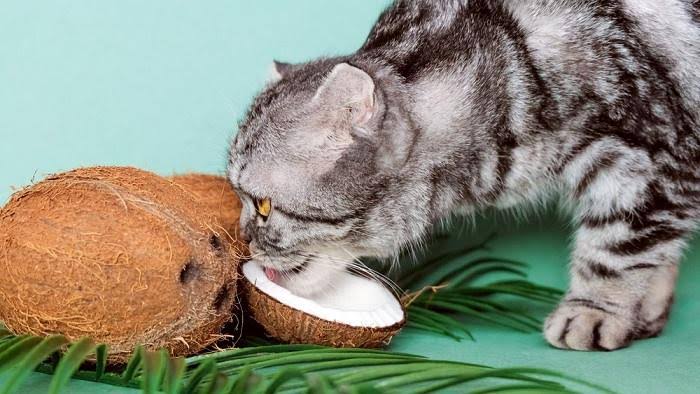
Nutritional Considerations Of Coconut
Coconut boasts an impressive nutritional profile, offering a range of vitamins, minerals, and healthy fats. Understanding its nutritional composition can help pet owners make informed decisions about whether to include coconut in their cat’s diet.
Vitamins And Minerals
Coconut is packed with essential vitamins and minerals that contribute to overall health and well-being. These include:
- Vitamin C: Known for its antioxidant properties, vitamin C supports immune function and helps protect cells from damage.
- Vitamin E: Another potent antioxidant, vitamin E plays a role in skin health, immune function, and cell regeneration.
- B Vitamins: Coconut contains various B vitamins, including B1 (thiamine), B2 (riboflavin), B3 (niacin), B5 (pantothenic acid), and B6 (pyridoxine). These vitamins are essential for energy metabolism, nervous system function, and overall vitality.
- Minerals: Coconut is rich in minerals like potassium, magnesium, phosphorus, and iron, which are vital for muscle function, bone health, and blood cell production.
Healthy Fats
One of the standout features of coconut is its high content of healthy fats, particularly medium-chain triglycerides (MCTs). These fats are easily digested and metabolized by the body, making them a quick source of energy. MCTs have been associated with various health benefits, including improved cognitive function, increased energy expenditure, and potential weight management.
Fiber
Coconut also contains dietary fiber, which plays a crucial role in digestive health and regularity. Fiber helps promote satiety, regulate blood sugar levels, and support a healthy gut microbiome. However, it’s essential to note that cats have limited dietary requirements for fiber, so excessive consumption may lead to digestive upset.
Caloric Content
Despite its nutritional benefits, coconut is relatively high in calories, primarily due to its fat content. Pet owners should be mindful of portion sizes when offering coconut to their cats to prevent excessive calorie intake, which could contribute to weight gain or obesity.
How To Safely Feed Coconut To Cats
Introducing coconut into your cat’s diet can be a nutritious and flavorful addition, but it’s essential to do so safely and in moderation. Here are some guidelines to follow when feeding coconut to your feline friend:
1. Start Slowly
When introducing coconut to your cat’s diet for the first time, start with a small amount to gauge their tolerance. Mix a tiny portion of coconut oil or coconut milk into their food and observe how they respond. Monitor for any signs of digestive upset or adverse reactions before increasing the amount.
2. Choose High-Quality Products
Opt for high-quality, organic coconut products free from additives, preservatives, and artificial flavors. Look for virgin or cold-pressed coconut oil and unsweetened coconut milk to ensure the purest form of coconut without any harmful ingredients.
3. Offer In Moderation
While coconut can offer potential health benefits for cats, it’s essential to offer it in moderation to prevent overconsumption of calories and fat. Limit the amount of coconut you feed your cat to avoid potential weight gain or digestive issues. A small amount as an occasional treat is typically sufficient.
4. Monitor Portion Sizes
Be mindful of portion sizes when feeding coconut to your cat. A teaspoon or less of coconut oil or a small spoonful of coconut milk is usually adequate for most cats. Avoid feeding large quantities of coconut, as excessive intake may lead to digestive upset or calorie overload.
5. Observe For Adverse Reactions
Keep an eye on your cat’s response to coconut consumption and watch for any signs of adverse reactions. Symptoms such as vomiting, diarrhea, lethargy, or changes in appetite may indicate that coconut is not well tolerated and should be discontinued.
6. Incorporate Variety
While coconut can be a tasty treat for cats, it should not replace essential nutrients found in a balanced cat diet. Offer coconut as an occasional supplement or treat, alongside a variety of other cat-friendly foods to ensure your pet receives a well-rounded nutrition.
7. Consult With A Veterinarian
Before making any significant changes to your cat’s diet, including the introduction of coconut, it’s essential to consult with your veterinarian. Your vet can provide personalized recommendations based on your cat’s individual dietary needs, health status, and any underlying medical conditions.
Recommended: Are Hydrangeas Poisonous to Cats?
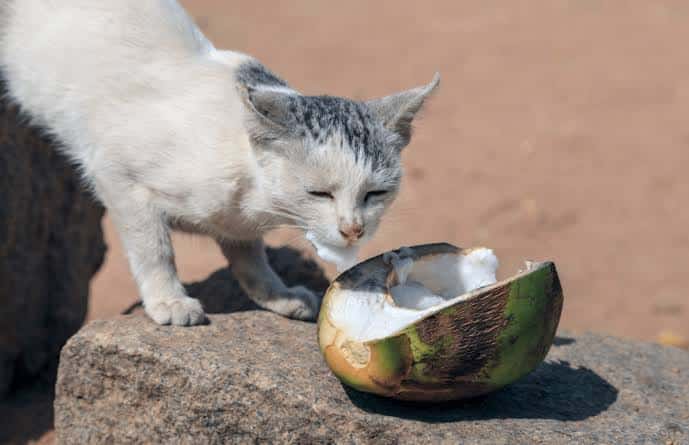
Alternative To Coconut For Cats
If you’re looking for alternative treats or supplements for your cat that offer similar health benefits to coconut, there are plenty of options to consider. Here are some cat-friendly alternatives to coconut:
1. Fish-Based Treats
Fish-based treats are a popular choice for cats, providing essential omega-3 fatty acids and protein. Look for treats made from high-quality fish sources such as salmon, tuna, or whitefish. Fish treats can help support healthy skin and coat, promote joint health, and provide a tasty snack for your cat.
2. Chicken or Turkey Treats
Chicken or turkey-based treats are another excellent option for cats, offering lean protein and essential amino acids. Look for treats made from real chicken or turkey meat, without any artificial additives or fillers. These treats can be a nutritious and satisfying alternative to coconut for your feline companion.
3. Freeze-Dried Meat Treats
Freeze-dried meat treats are made from real meat that has been freeze-dried to preserve its natural flavor and nutrients. These treats are often available in various protein sources, including chicken, turkey, beef, and fish. Freeze-dried meat treats are rich in protein, low in carbohydrates, and free from artificial additives, making them a healthy and satisfying option for cats.
4. Catnip
Catnip is a herb that is known to elicit a playful response in many cats. Offering catnip-infused toys or treats can provide enrichment and mental stimulation for your cat. However, not all cats are affected by catnip, so it’s essential to observe your cat’s reaction before incorporating it into their routine.
5. Vegetables And Fruits
Some cats enjoy small amounts of vegetables and fruits as occasional treats. Safe options include cooked or pureed vegetables such as pumpkin, carrots, or green beans, and cat-friendly fruits such as mashed or pureed pumpkin, cantaloupe, or watermelon. These treats can provide additional nutrients and fiber to your cat’s diet.
6. Homemade Treats
If you prefer to make treats for your cat at home, there are plenty of simple recipes available online. Homemade treats can be made using ingredients such as cooked chicken or turkey, canned tuna, or baby food. Just be sure to avoid any ingredients that are toxic to cats, such as onions, garlic, or chocolate.
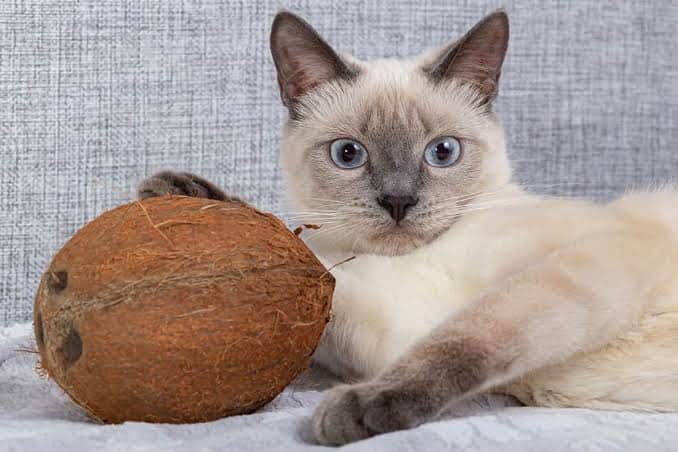
FAQs
1. Can Cats Eat Coconut?
While coconut is generally considered safe for cats in moderation, it’s essential to introduce it gradually and monitor your cat’s response. Some cats may be sensitive to coconut or experience digestive upset if they consume it in large quantities.
2. What Types Of Coconut Products Are Safe For Cats?
Some types of coconut products that cats can safely consume include coconut oil, coconut milk (unsweetened), desiccated coconut (in small amounts), and coconut treats specifically formulated for cats. It’s crucial to choose high-quality, natural products without any added sugars or artificial additives.
3. Are There Any Health Benefits To Feeding Coconut To Cats?
Coconut offers several potential health benefits for cats when incorporated into their diet in moderation. These benefits may include improved skin and coat health, digestive support, immune system support, weight management, and dental health. However, more research is needed to fully understand the effects of coconut on feline health.
4. How Much Coconut Can I Safely Feed My Cat?
The amount of coconut you can safely feed your cat depends on various factors, including their size, weight, age, and overall health. It’s essential to offer coconut in moderation and monitor your cat’s response. As a general guideline, a small amount of coconut oil or coconut milk as an occasional treat is usually sufficient for most cats.
5. What Should I Do If My Cat Has An Adverse Reaction To Coconut?
If your cat experiences any adverse reactions after consuming coconut, such as vomiting, diarrhea, lethargy, or changes in appetite, discontinue feeding coconut immediately and consult with your veterinarian. Your vet can provide guidance and determine the best course of action based on your cat’s individual needs.
6. Can Coconut Replace Essential Nutrients In My Cat’s Diet?
While coconut can offer potential health benefits for cats, it should not replace essential nutrients found in a balanced cat diet. Coconut can be offered as a supplement or occasional treat, but it should not be the primary source of nutrition for your cat.
7. Are There Any Alternatives To Coconut For Cats?
Yes, there are plenty of alternative treats and supplements for cats that offer similar health benefits to coconut. Some alternatives include fish-based treats, chicken or turkey treats, freeze-dried meat treats, catnip-infused toys or treats, vegetables and fruits (in small amounts), commercial cat treats, and homemade treats made from cat-safe ingredients. Always choose options that are appropriate for your cat’s dietary needs and preferences.
Recommended: Are Lilies Toxic To Cats: Find Out If Lilies Affects Your Cat
Conclusion
In conclusion, while coconut can offer potential health benefits for cats when incorporated into their diet in moderation, it’s essential to approach its consumption with caution and consideration. Coconut products such as coconut oil, coconut milk, and coconut treats can provide cats with essential nutrients, promote skin and coat health, support digestion, and offer a tasty treat option.
However, it’s crucial to introduce coconut gradually, monitor your cat’s response, and consult with your veterinarian before making any significant changes to their diet. Some cats may be sensitive to coconut or experience digestive upset if they consume it in large quantities.
Additionally, coconut should not replace essential nutrients found in a balanced cat diet. Coconut can be offered as a supplement or occasional treat, but it should not be the sole source of nutrition for your cat.

